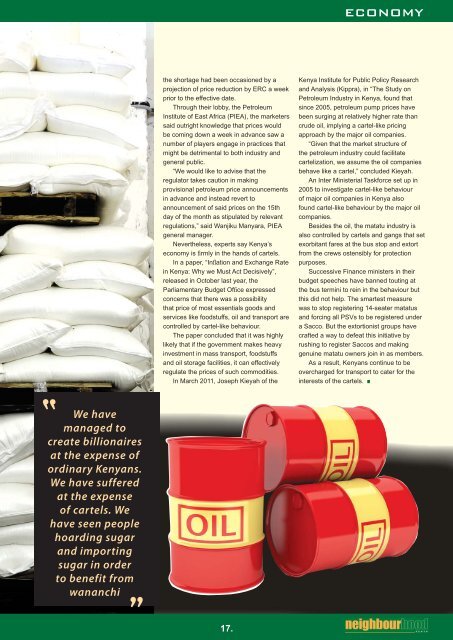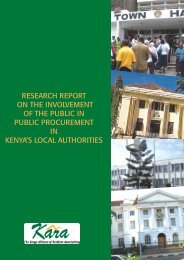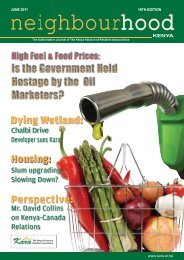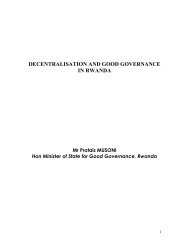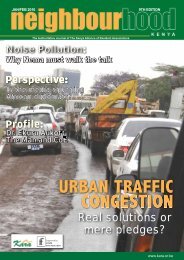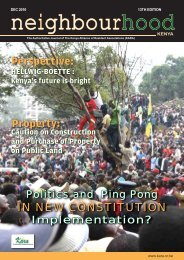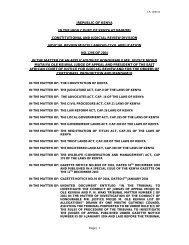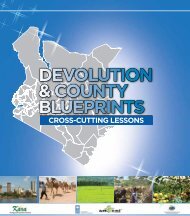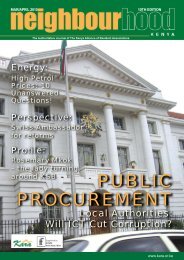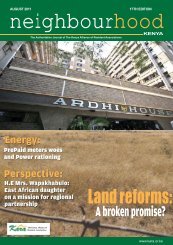Neighbourhood Kenya 20th Edition - Kara
Neighbourhood Kenya 20th Edition - Kara
Neighbourhood Kenya 20th Edition - Kara
You also want an ePaper? Increase the reach of your titles
YUMPU automatically turns print PDFs into web optimized ePapers that Google loves.
ECONOMY XXXXXXXX PROFILE<br />
the shortage had been occasioned by a<br />
projection of price reduction by ERC a week<br />
prior to the effective date.<br />
Through their lobby, the Petroleum<br />
Institute of East Africa (PIEA), the marketers<br />
said outright knowledge that prices would<br />
be coming down a week in advance saw a<br />
number of players engage in practices that<br />
might be detrimental to both industry and<br />
general public.<br />
“We would like to advise that the<br />
regulator takes caution in making<br />
provisional petroleum price announcements<br />
in advance and instead revert to<br />
announcement of said prices on the 15th<br />
day of the month as stipulated by relevant<br />
regulations,” said Wanjiku Manyara, PIEA<br />
general manager.<br />
Nevertheless, experts say <strong>Kenya</strong>’s<br />
economy is fi rmly in the hands of cartels.<br />
In a paper, “Inflation and Exchange Rate<br />
in <strong>Kenya</strong>: Why we Must Act Decisively”,<br />
released in October last year, the<br />
Parliamentary Budget Office expressed<br />
concerns that there was a possibility<br />
that price of most essentials goods and<br />
services like foodstuffs, oil and transport are<br />
controlled by cartel-like behaviour.<br />
The paper concluded that it was highly<br />
likely that if the government makes heavy<br />
investment in mass transport, foodstuffs<br />
and oil storage facilities, it can effectively<br />
regulate the prices of such commodities.<br />
In March 2011, Joseph Kieyah of the<br />
<strong>Kenya</strong> Institute for Public Policy Research<br />
and Analysis (Kippra), in “The Study on<br />
Petroleum Industry in <strong>Kenya</strong>, found that<br />
since 2005, petroleum pump prices have<br />
been surging at relatively higher rate than<br />
crude oil, implying a cartel-like pricing<br />
approach by the major oil companies.<br />
“Given that the market structure of<br />
the petroleum industry could facilitate<br />
cartelization, we assume the oil companies<br />
behave like a cartel,” concluded Kieyah.<br />
An Inter Ministerial Taskforce set up in<br />
2005 to investigate cartel-like behaviour<br />
of major oil companies in <strong>Kenya</strong> also<br />
found cartel-like behaviour by the major oil<br />
companies.<br />
Besides the oil, the matatu industry is<br />
also controlled by cartels and gangs that set<br />
exorbitant fares at the bus stop and extort<br />
from the crews ostensibly for protection<br />
purposes.<br />
Successive Finance ministers in their<br />
budget speeches have banned touting at<br />
the bus termini to rein in the behaviour but<br />
this did not help. The smartest measure<br />
was to stop registering 14-seater matatus<br />
and forcing all PSVs to be registered under<br />
a Sacco. But the extortionist groups have<br />
crafted a way to defeat this initiative by<br />
rushing to register Saccos and making<br />
genuine matatu owners join in as members.<br />
As a result, <strong>Kenya</strong>ns continue to be<br />
overcharged for transport to cater for the<br />
interests of the cartels.<br />
We have<br />
managed to<br />
create billionaires<br />
at the expense of<br />
ordinary <strong>Kenya</strong>ns.<br />
We have suffered<br />
at the expense<br />
of cartels. We<br />
have seen people<br />
hoarding sugar<br />
and importing<br />
sugar in order<br />
to benefit from<br />
wananchi<br />
17.


